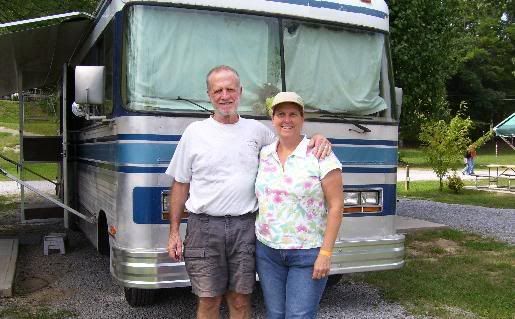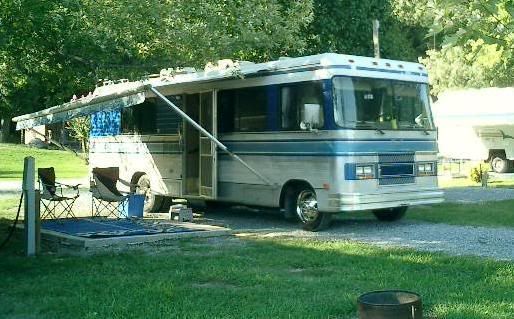Page 1 2
Go to...  | Start A New Topic  | Search  | Notify  | Tools  | Reply To This Topic  |  |
 6/12 6/12Formally known as "Humbojb" 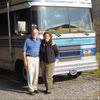 |
Been reading about Breakaways and diesels in general. Sometimes they seem to stop while traveling down the road for various reasons.The 91 Breakaway will be heading for Tennessee soon. Quick question. I don't have any experience driving an Allison 4-speed. There is a yellow knob that you pull to put the parking brake on and push when you want to go (or maybe it's the other way around). What happens if you have one of these 'engine stops running' while moving? This Breakaway is air over hydraulic brakes. I guess it has some kind of compressor to furnish the air for the braking system and the park brake as well. Does the air brake automatically come on? If so, do you stop 'all of a sudden'? Can you coast over to the side of the road? Do you have any brakes at all? That's what I do in the 85 454 Regal. Sorry for this dumb question. Just trying to learn. Jim
| |||||||||||
|
 5/12 5/12 |
The Mechanics can correct me but as a layman your ( and my) brakes are full on in a natural state. the air releases the break to allow the coach to mine. In other words no air pressure you are not moving. If the engine stops you can roll and break normally until the air in the tanks id depleted then you are stopped. Just try driving off before the air pressure is up. Wayne | |||
|
"Host" of Barthmobile.com 1/19 1/19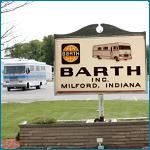 |
If you deplete your air, the brakes will apply. If the engine isn't running the air psi will not recover as you're using them - the parking brakes will apply only if the air psi drops below 60'ish. You'll do ok.
| |||||||||||||||
| ||||||||||||||||
 5/10 5/10 |
correct me if I am wrong (no Allison here just Eaton), there is no "park", so always pull out your yellow knob when you do not want to roll. 1999 Bluebird Custom 33' 8.3 Cummins diesel pusher Former owner 1989 Barth Regal 25' | |||
|
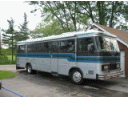 |
[QUOTE]Originally posted by Jim and Tere: "There is a yellow knob that you pull to put the parking brake on and push in when you want to go." That is correct. "What happens if you have one of these 'engine stops running' while moving?" Get off the live lane as soon as possible. You will hear the alarm if your pressure drops so you have some time. "Does the air brake automatically come on?" It does as soon as your air pressure drops below a certain psi. On ours its approx 60 psi. "If so, do you stop 'all of a sudden?" It is the same as when you pull out the yellow knob to apply your parking brake when stopped. It works on your rear wheels only and so they will lock up when your air pressure drops. "Can you coast over to the side of the road?" Not with your rear wheels locked up! "Sorry for this dumb question." There are no dumb questions. It is dumb to not ask! Jim[QUOTE] Your going to love driving the Breakaway! Have fun! Don 1990 Regency 34' Cummins 6CTA 8.3 240hp Spartan Chassis, 4 speed Allison MT643 | |||
|
 3/11 3/11 |
When we got our Regency the series of manuals included an article on air brakes that was published in the October 2001 issue of FMC Magazine. I would suggest you look this up online or through your local public library. In short, the Yellow Knob is separate from your main service brakes and uses high pressure air to disengage the parking brake. If you pull the knob out while underway you are coming to an instantaneous and hard stop on your rear wheels only. The loud rush of air when you pull the knob out is the release of 120psi that locks the rear wheels. If this is not available I can make a copy for Bill's CD collection. 1993 32' Regency Wide Body, 4 speed Allison Trans, Front Entry door, Diamond Plate aluminum roof & 1981 Euro 22' w Chevy 350 engine and TH 400 tranny | |||
|
 3/19 3/19 |
I think you mean it is the release of the air pressure that has been keeping the rear brake 'off'. I think they are spring-loaded 'on' http://www.rvforum.net/joomla/...ance-items&Itemid=45 | |||
|
 3/11 3/11 |
Yes, just a bit clumsy way of saying they are normally on. Another way to explain is to think of riding a horse, when you pull the reins (handle) you stop, when you push(press) you go. 1993 32' Regency Wide Body, 4 speed Allison Trans, Front Entry door, Diamond Plate aluminum roof & 1981 Euro 22' w Chevy 350 engine and TH 400 tranny | |||
|
 |
Jim Another thought. Can you legally drive an air brake or air over hydralic system in your state without an air endorsement on your driver's license? To legally drive our Barth I had to take a 2 day course on air brakes from a truck/tractor trailer school to get a Z endorsement on my driver's license. Don 1990 Regency 34' Cummins 6CTA 8.3 240hp Spartan Chassis, 4 speed Allison MT643 | |||
|
 6/12 6/12Formally known as "Humbojb"  |
Will check with the state of Tennessee about the license requirements. Thanks for the heads up. Sounds like when the air pressure gets to about 60psi, the yellow knob activated parking break will come on strong and hard. How long --in seconds--approximately--do you have to get over to the side of the road before that 60psi is reached? Maybe 10 seconds? It would really be scary for it to come on if you were in one of the driving lanes. Jim
| ||||||||||||
|
It will depend on how fast you are losing air. And if you touch your brakes you will be using air so it will go down that much faster. | ||||
|
 5/10 5/10 |
Jim you worry too much. Catastrophic air failure is rare, more likely a slow leak or you never build up air from the getgo. Do not take off until you have a full head of air. Test th system by shutting th engine off and pumping the brakes down. youButton pops out at 60 psi. Krank back up and build pressure back up. Down th road keep an eye on the gaugee, it will vary but if it goes below 90 psi and does NOT rebuild air, check things out. Doris 1999 Bluebird Custom 33' 8.3 Cummins diesel pusher Former owner 1989 Barth Regal 25' | |||
|
If your engine stops, you will not loose air pressure if you do nothing. The only other system that uses a lot of air is the regular service brakes thru the brake pedal. What others have said is correct, maneuver off the main lanes to the side as quickly as possible with a minimal use of the foot brakes to conserve air. If all is clear you can use the foot brakes many times before you will get to 60 PSI. Further if you apply brakes with a steady foot pressure on the peddle, (no pumping the brakes) you only use a given amount of air for each brake application of the peddle. To get a better feeling of all this, get in the Breakaway, start and run the engine until you here the dryer blow off. You now have a full tank (actually 2 separate compartments in the same tank) of air. Turn off the engine Then start to pump the brakes on and off while watching the air pressure gauges. You will see a decline in pressure each time you and release the brake peddle. Keep doing this until the low air warning light comes on. You will be amazed at how many full applications of the brake peddle it takes to get it down to approximately 60 PSI. The above only applies to a loss of engine while driving. If you get an air leak that is at a higher rate than what the engine driven air pump can replace, Then you have a MUCH bigger problem unless you are watching the air pressure gauge and see that you are loosing air and take immediate action. Last thing I would recommend is to apply the parking brake, then with the engine running go to 1st gear and apply a bit of throttle, repeat in "R" if the coach moves rather easily, then you need to have the parking brake adjusted or at least inspected. The parking brake is applied (as has been said) with a big spring in the canister and sometimes this spring gets tired or broken. In my case it was the cable that had stretched or the brake shoes in the parking brake drum had worn and the parking brake would NOT hold the coach on a slight grade. the parking brake is the only thing that holds your coach while parked. I later had a second problem with the brake not holding and it was because I had a rear seal leak at the transmission and the parking brake was contaminated with trans oil. I carry wheel chocks and use them if I am parked on a grade, or use the jacks which would also restrict movement while parked. I always check the sir pressure regularly just as I check the engine oil pressure and temperature. I usually double check the air pressure at the top or near the top of a grade that I know I will be descending. Lastly, the parking brake will NOT come on instantaneously with a slow loss of air pressure. As the pressure approached 60 PSI, (and that number will vary quite a bit from coach to coach) the parking brake will start to come on. The only way the parking brake will go full on instantaneously is a complete and rapids loss of air pressure OR the manual application with the park brake yellow pressure switch. HTH Ed 94 30' Breakaway #3864 30-BS-6B side entry New Cummins 5.9L, 375+ HP Allison 6 speed Spartan chassis K9DVC Tankless water heater | ||||
|
"Host" of Barthmobile.com 1/19 1/19 |
Not required in the USA - The RV lobbyist have that one taken care of. A 16 yr old, with a newly minted license, can drive a 40' airbrake motorhome without them running afoul of the law.
| |||||||||||||||
| ||||||||||||||||
 6/12 6/12Formally known as "Humbojb"  |
What great info. Thanks to all. I feel like I have been given some really valuable information. Jim
| ||||||||||||
|
| Powered by Social Strata | Page 1 2 |
| Please Wait. Your request is being processed... |
|
This website is dedicated to the Barth Custom Coach, their owners and those who admire this American made, quality crafted, motor coach.
We are committed to the history, preservation and restoration of the Barth Custom Coach.
We are committed to the history, preservation and restoration of the Barth Custom Coach.
